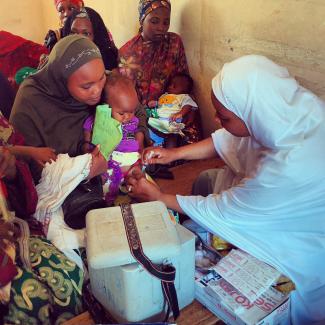Community education and outreach improves service delivery by helping patients get access to healthcare. Engaging with communities and patients also enables recognition of illness and awareness of the benefits around lifesaving health services. Health system learning activities conducted in cooperation with individuals and groups in a community raise awareness, transfer knowledge and skills, and catalyze behavior change, as was the case with a Nigerian community’s attitude toward immunizations.
Adamu Mamman never trusted immunizations. If the conspiracy theories he believed about polio vaccines were really true, why should he have any confidence in routine immunizations for tuberculosis, meningitis, or hepatitis either? As a local Secretary of Education in Nigeria’s Bauchi state, Mamman’s opinion mattered a lot. If he was against it, so was most everybody else. USAID wanted to help the local health officials immunize all the kids in the area, and Mamman and “community influencers” like him were the key to their strategy. If he could be “turned” in favor of routine immunizations, the rest of the community would follow. Efforts in the last decade to sway “refusers” didn’t work. But simple logic did. USAID provided technical support for a series of trainings that pointed out that a child with polio is a lifelong burden to his or her parents; diseases such as measles could also bring the chance of permanent disability – and a life of economic and emotional hardship for their parents. It worked. Mamman not only changed his mind, he encouraged his entire constituency in the scholastic community to do the same. Nearly all the kids got vaccinated this year.“ I feel sorry my actions have denied immunization service to children,” Mamman said. “My days of ignorance are now over. I will ensure that every parent knows about the benefits of immunization.”
USAID supports service delivery interventions, like community education and outreach, to ensure people have access to effective, safe, and high-quality health services when and where they are needed in order to sustain health and well-being and to prevent illness and death. Strengthening service delivery in a health system entails increasing service availability throughout the country, developing cost-effective packages of essential health services, and improving and using links between incentives, productivity and quality. Nigeria’s focus on service delivery interventions, when scaled up with a package of other proven health systems interventions, can contribute to saving over 1.2 million lives from 2016-2020.
Meet more of the women and children that benefit from USAID's efforts.

eHealth Africa, Courtesy of Photoshare
